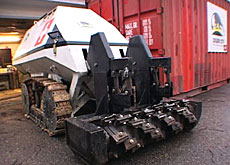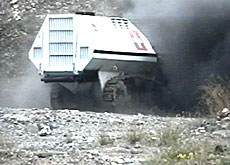Demining experts start work in Iraq

The Swiss Foundation for Mine Action (FSD) has sent five emergency response teams to Iraq to begin clearing the country's roads and towns of unexploded munitions.
The Geneva-based organisation was asked by the United Nations World Food Programme (WFP) to carry out the work to speed up the delivery of much-needed supplies.
“We open the roads, we make sure that the warehouses are safe and that offices can be used and that the civilian population can get the assistance they need without being hurt by bombs and mines,” the Swiss head of the FSD, Hansjörg Eberle, told swissinfo.
“We have seen pictures which look alarming,” he added. “Places like mosques and areas around schools with unexploded munitions littered about and buried weapons, which children are attracted to.”
With UN food convoys now on the road in Jordan and Iran, the WFP announced last week that it planned to open two new humanitarian corridors into Iraq, which the FSD will be responsible for clearing.
As the UN’s standby demining organisation, the FSD can be pressed into action at 72 hours notice from the world body.
Following such a request, the non-governmental organisation recently sent a first group of experts to the Middle East to recruit and train dozens of local demining workers in the Iraqi border states of Kuwait, Iran and Jordan.
The specialists have also conducted survey missions in Iraq to get an idea of what type of unexploded ordinance remains on the ground, as a result of the coalition bombing raids and the abandonment of Iraqi military vehicles and installations by surrendering soldiers.
Some of the munitions they’ll be facing in Iraq date back to the Iran-Iraq war in the 1990s as well as the 1991 Gulf War, although Eberle expects that they will uncover a “new layer” of deadly munitions left over from the latest conflict.
Heavy equipment
The FSD has ordered heavy equipment for the job in Iraq, including protected anti-mine vehicles, which are specially built to absorb the shock of an explosion. But Eberle said it could take weeks or months before the machinery arrives.
“In the meantime, it will be just men with their vehicles and their hands, clearing bombs and mines as fast as they can,” he said. “It’s an extremely tedious and dangerous process of digging up landmines and individually picking up cluster bombs, which must be exploded one by one.”
According to Eberle, the FSD is the only demining group currently working in Iraq, although he hopes the situation will soon change.
“I would be very happy to see other organisations going there because it’s too much of a job for a single organisation,” he said.
Safe access
Throughout the war and since the fall of Saddam Hussein’s government, dozens of aid organisations, including UN agencies, have been waiting in neighbouring states until they can gain safe access into Iraq.
Ongoing fighting and social unrest, along with a shortage of fuel, have so far prevented most relief supplies from reaching the cities and rural areas, although a few trucks carrying water and food have reached Baghdad and the southern city of Basra.
As a result of their long wait to enter Iraq, Eberle worries that many aid workers will be injured or killed by unexploded munitions, as they rush to deliver supplies.
“Over the next few weeks we will see NGOs and organisations trying to get on the ground and running huge risks in trying to help people because they feel it’s necessary… so accidents might happen,” he told swissinfo.
He is also concerned that the FSD teams will come under pressure from other humanitarian groups, who are unaware that mine clearing is a painstaking process.
“There is a lot of pressure on us already and people feel we should move faster,” he said, “but we are subcontracted to the UN and we’re obliged to work according to their rules so if they say it’s a no-go, then it’s a no-go.”
Long experience
The FSD’s teams are led by international civilians with a military background, who have worked in hotspots around the world from Afghanistan to Angola and Sri Lanka to Sudan.
They receive extensive training in dealing with anti-personnel mines, as well as biological and chemical weapons, and are prepared to deal with a wide range of weapons including buried landmines, cluster bombs, missiles, laser-guided bombs and artillery shells.
The FSD is financed by various sources including private donors, cantonal authorities, Swiss and international organisations and governments, including the United States and Germany.
During emergency response situations, such as the one in Iraq, the group generally receives funding from the requesting agency – in this case, the UN World Food Programme.
According to Eberle, however, the organisation is suffering from a lack of money as the result of decreasing contributions from the Swiss government.
“Unfortunately, year after year, we see these amounts shrinking,” he said. “The government is unsure whether it should be involved in mine clearance at all… and now it appears that Swiss development aid cannot be used for it.”
“This does not mean the Swiss government won’t help us anymore, but we’ve certainly seen less and less money trickling in,” he added. “I don’t fully understand why because I think it would be in the political interest of Switzerland to say they support this activity.”
Responsibility
In response to Eberle’s comments, Marco Ferrari, deputy head of the Swiss Agency for Development and Cooperation’s humanitarian division, said that the government “would very much like to increase” its contributions but that it had “its own budgetary restrictions”.
Ferrari also argues that mine clearing should not be regarded as a humanitarian activity.
“We would like to concentrate on mine victim assistance and prevention and awareness,” he told swissinfo. “If you have an occupying power, it would not be logical to bring humanitarian actors in to take care of demining and not use the military forces already in place.”
Eberle points out, however, that militaries tend to be concerned with conducting demining for their own purposes, leaving humanitarian and civilian organisations to do the rest.
“In my experience, the military might clear a road or a field because they want to move a truck or a tank,” he said. “But humanitarian mine clearance is done by organisations such as the FSD or commercial companies.”
“There is an ongoing discussion about the responsibility of cleaning up after conflicts based on the principle that those who pollute should clean up the mess,” he added. “But we are a neutral organisation and we cannot influence politics.”
Meanwhile, the Swiss Army does provide machinery to the organisation and occasionally loans out anti-mine personnel to help with FSD projects.
Eberle said he had requested the help of Swiss army professionals in Iraq but that the military judged it too risky to send their soldiers into the country for the time being.
swissinfo, Anna Nelson in Geneva
Demining experts from the Swiss Foundation for Mine Action have begun work in Iraq, at the request of the United Nations World Food Programme.
Their immediate tasks are to train around 80 local demining workers and to lead teams of mine-clearing specialists in Iraq.
They will be responsible for clearing roads and warehouses of unexploded munitions so that humanitarian aid can be distributed to the civilian population.
The head of the non-governmental organisation, Hansjörg Eberle, worries that many relief workers will run unnecessary risks in their rush to enter Iraq.

In compliance with the JTI standards
More: SWI swissinfo.ch certified by the Journalism Trust Initiative











You can find an overview of ongoing debates with our journalists here . Please join us!
If you want to start a conversation about a topic raised in this article or want to report factual errors, email us at english@swissinfo.ch.